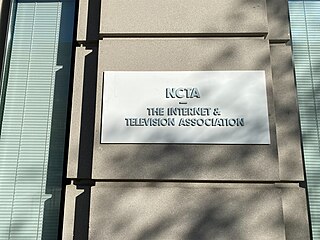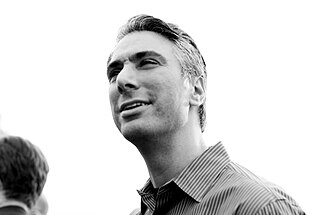Related Research Articles

The Federal Communications Commission (FCC) is an independent agency of the United States government that regulates communications by radio, television, wire, satellite, and cable across the United States. The FCC maintains jurisdiction over the areas of broadband access, fair competition, radio frequency use, media responsibility, public safety, and homeland security.

The National Telecommunications and Information Administration (NTIA) is an agency of the United States Department of Commerce that serves as the president's principal adviser on telecommunications policies pertaining to the United States' economic and technological advancement and to regulation of the telecommunications industry.

The telecommunications policy of the United States is a framework of law directed by government and the regulatory commissions, most notably the Federal Communications Commission (FCC). Two landmark acts prevail today, the Communications Act of 1934 and the Telecommunications Act of 1996. The latter was intended to revise the first act and specifically to foster competition in the telecommunications industry.

Michael Kevin Powell is an American attorney and lobbyist who served as the 24th chairman of the Federal Communications Commission from 2001 to 2005. Since leaving office, Powell has since worked as the president of the National Cable & Telecommunications Association (NCTA), a broadband industry trade association.
Municipal broadband is broadband Internet access offered by public entities. Services are often provided either fully or partially by local governments to residents within certain areas or jurisdictions. Common connection technologies include unlicensed wireless, licensed wireless, and fiber-optic cable. Many cities that previously deployed Wi-Fi based solutions, like Comcast and Charter Spectrum, are switching to municipal broadband. Municipal fiber-to-the-home networks are becoming more prominent because of increased demand for modern audio and video applications, which are increasing bandwidth requirements by 40% per year. The purpose of municipal broadband is to provide internet access to those who cannot afford internet from internet service providers and local governments are increasingly investing in said services for their communities.

NCTA, formerly known as the National Cable & Telecommunications Association (NCTA), is a trade association representing the broadband and cable television industries in the United States. As of 2011, NCTA represented more than 90% of the U.S. cable market, over 200 cable networks, and various equipment suppliers and service providers to the cable industry.

CTIA is a trade association representing the wireless communications industry in the United States. The association was established in 1984 and is headquartered in Washington, D.C. It is a 501(c)(6) nonprofit membership organization, and represents wireless carriers and suppliers, and manufacturers and providers of wireless products and services.
Bandwidth allocation is the process of assigning radio frequencies to different applications. The radio spectrum is a finite resource, which means there is great need for an effective allocation process. In the United States, the Federal Communications Commission or FCC has the responsibility of allocating discrete portions of the spectrum, or bands, to various industries. The FCC did this recently, when it shifted the location of television broadcasting on the spectrum in order to open up more space for mobile data. Different bands of spectrum are able to transmit more data than others, and some bands of the spectrum transmit a clearer signal than others. Bands that are particularly fast or that have long range are of critical importance for companies that intend to operate a business involving wireless communications.
In the United States, net neutrality—the principle that Internet service providers (ISPs) should make no distinctions between different kinds of content on the Internet, and to not discriminate based on such distinctions—has been an issue of contention between end-users and ISPs since the 1990s. With net neutrality, ISPs may not intentionally block, slow down, or charge different rates for specific online content. Without net neutrality, ISPs may prioritize certain types of traffic, meter others, or potentially block specific types of content, while charging consumers different rates for that content.

The Internet in the United States grew out of the ARPANET, a network sponsored by the Advanced Research Projects Agency of the U.S. Department of Defense during the 1960s. The Internet in the United States of America in turn provided the foundation for the worldwide Internet of today.
Public Knowledge is an American non-profit public interest group based in Washington, D.C. Founded in 2001 by David Bollier, Gigi Sohn, and Laurie Racine, Public Knowledge is primarily involved in the fields of intellectual property law, competition and choice in the digital marketplace, and an open standards/end-to-end internet.

Julius Genachowski is an American lawyer and businessman. He became the Federal Communications Commission Chairman on June 29, 2009. On March 22, 2013, he announced he would be leaving the FCC in the coming weeks. On January 6, 2014, it was announced that Genachowski had joined The Carlyle Group. He transitioned from Partner and Managing Director to Senior Advisor in early 2024.

Kevin Werbach is an American academic, businessman and author. In 2002, he founded the Supernova Group, a technology analysis and consulting firm. Since 2004, Werbach is an Associate Professor of Legal Studies and Business Ethics at The Wharton School, University of Pennsylvania. He writes about business, policy, and social implications of emerging Internet and communications technologies.

Susan P. Crawford is the John A. Reilly Clinical Professor of Law at Harvard Law School. She served as President Barack Obama's Special Assistant for Science, Technology, and Innovation Policy (2009) and is a columnist for WIRED. She is a former board member of ICANN, the founder of OneWebDay, and a legal scholar. Her research focuses on telecommunications and information law.
Connecting America: The National Broadband Plan is a Federal Communications Commission (FCC) plan to improve Internet access in the United States. The FCC was directed to create the plan by the American Recovery and Reinvestment Act of 2009, and unveiled its plan on March 16, 2010.

Blair Steven Levin is an American lawyer formerly with the Federal Communications Commission, who served as the executive director of the National Broadband Plan from 2009 to 2010. During the presidency of Bill Clinton he was chief of staff to FCC chairman Reed Hundt from 1993 to 1997.
The Federal Communications Commission Open Internet Order of 2010 is a set of regulations that move towards the establishment of the internet neutrality concept. Some opponents of net neutrality believe such internet regulation would inhibit innovation by preventing providers from capitalizing on their broadband investments and reinvesting that money into higher quality services for consumers. Supporters of net neutrality argue that the presence of content restrictions by network providers represents a threat to individual expression and the rights of the First Amendment. Open Internet strikes a balance between these two camps by creating a compromised set of regulations that treats all internet traffic in "roughly the same way". In Verizon v. FCC, the Court of Appeals for the D.C. Circuit vacated portions of the order that the court determined could only be applied to common carriers.
Broadband universal service, also known as "universal service obligation" (USO) or "universal broadband service", refers to government efforts to ensure all citizens have access to the internet. Universal voice service obligations have been expanded to include broadband service obligations in Switzerland, Finland, Spain and the UK.
The Wireless Infrastructure Association (WIA), formerly known as PCIA, is an American trade association for wireless providers and companies that build cell phone towers, rooftop wireless sites, and other facilities that transmit wireless communication signals. The Washington Post described the industry as "the people who build all those cell towers so you can actually make those calls, download that data." These technologies are collectively referred to as "wireless telecommunications infrastructure."

Brendan Thomas Carr is an American lawyer who has served as a member of the Federal Communications Commission (FCC) since 2017. Appointed to the position by Donald Trump, Carr previously served as the agency's general counsel and as an aide to FCC commissioner Ajit Pai. In private practice, Carr formerly worked as a telecommunications attorney at Wiley Rein.
References
- ↑ "About". The Blue Owl Group.
- ↑ @ColinCrowell (September 19, 2019). "8 years—it's been an extraordinary journey. Today, I'm sharing that I've made the decision to leave Twitter. It's…" (Tweet) – via Twitter.
- ↑ "Colin Crowell - Twitter - Vice President, Global Public Policy". csreports.aspeninstitute.org.
- ↑ @TheLBJSchool (May 15, 2020). "#LBJSchool is pleased to announce its 2020 graduation speaker: Colin Crowell, Twitter's former VP of @Policy. His w…" (Tweet) – via Twitter.
- ↑ LBJ School 2020 Commencement Virtual Ceremony
- 1 2 3 4 5 6 Kang, Cecilia (May 19, 2010). "Influential FCC Adviser Colin Crowell Prepares to Join the Industry He Oversaw". The Washington Post.
- ↑ "FCC broadband plan advisor Colin Crowell decides to move on", Fierce Telecom, May 6, 2010.
- ↑ David Cavicke, Republican chief of staff on the House Energy and Commerce Committee in Kang 2010
- ↑ Ben Scott, Free Press in Broadcasting & Cable Magazine, May 4, 2010.
- 1 2 Sohn, Gigi. "Public Knowledge Statement on Colin Crowell's Departure from the FCC | Public Knowledge". Public Knowledge. Archived from the original on June 9, 2010. Retrieved November 21, 2010.
- ↑ Colin Crowell - Platform of Possibilities Youtube
- ↑ Roda Viva | Colin Crowell | 26/09/2018 Youtube
- ↑ "Finding God in Twitter: Colin Crowell Applies Jesuit Education to Social Media" – via soundcloud.com.
- ↑ Hansell, Saul (August 10, 2009). "FCC Weighs Need for New Cellphone Handset Rules". The New York Times .
- ↑ Stetler, Brian; Wortham, Jenna (March 13, 2010). "Effort to Widen Internet Access Sets Up Battle". The New York Times.
- ↑ The Wall Street Journal, March 13, 2010.
- ↑ Johnson, Fawn (September 23, 2009). "Google's Phone Service Likely to Draw Scrutiny". The Wall Street Journal .
- ↑ Cauley, Leslie (September 20, 2009). "FCC Moving to Require 'Net Neutrality' by Providers". USA Today .
- ↑ Lazarus, David (December 6, 2009). "FCC Pushes For Internet Access on Your TV". Los Angeles Times .
- ↑ Szadkowski, Michaël (November 17, 2018). "Colin Crowell: Nous allons repenser différentes fonctions de Twitter". Le Monde .
- ↑ Goel, Vindu; Kramer, Andrew E. (2 January 2015). "Web Freedom Is Seen as a Growing Global Issue". The New York Times.
- ↑ "Washington Post Tech Blog", May 4, 2010.
- ↑ [ permanent dead link ] Commissioner Michael Copps, Federal Communications Commission May meeting at 1:40:15-1:47.
- 1 2 [ permanent dead link ] Chairman Julius Genachowski, Federal Communications Commission May meeting at 1:40:15.
- ↑ "Commentary: Liberal Group 'Veterans Education Success' Seeks to Re-Instate Obama-Era Education Policy Targeting Private Colleges". Tennessee Star. 2020-05-28. Retrieved 2022-02-16.